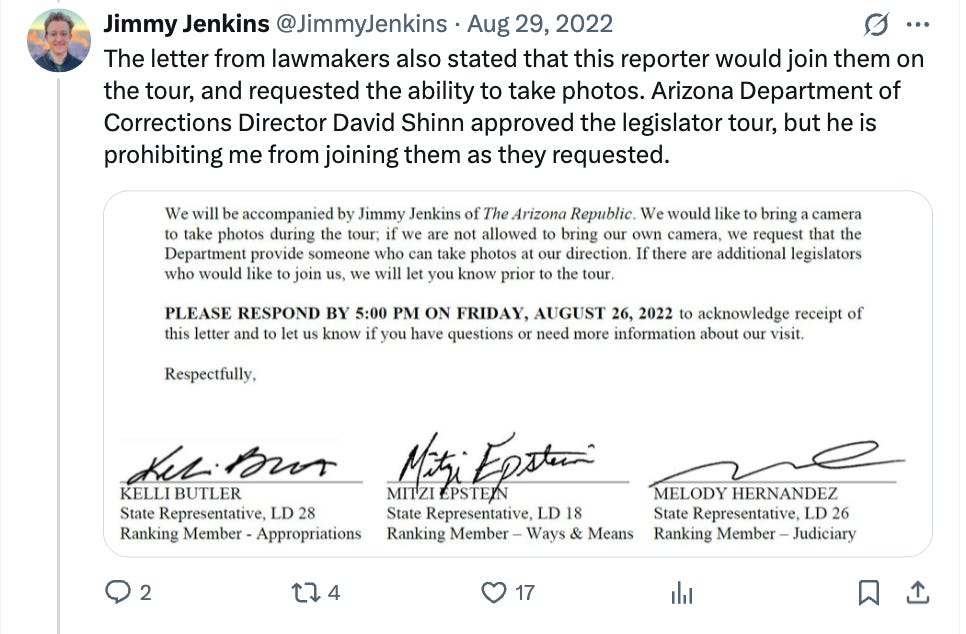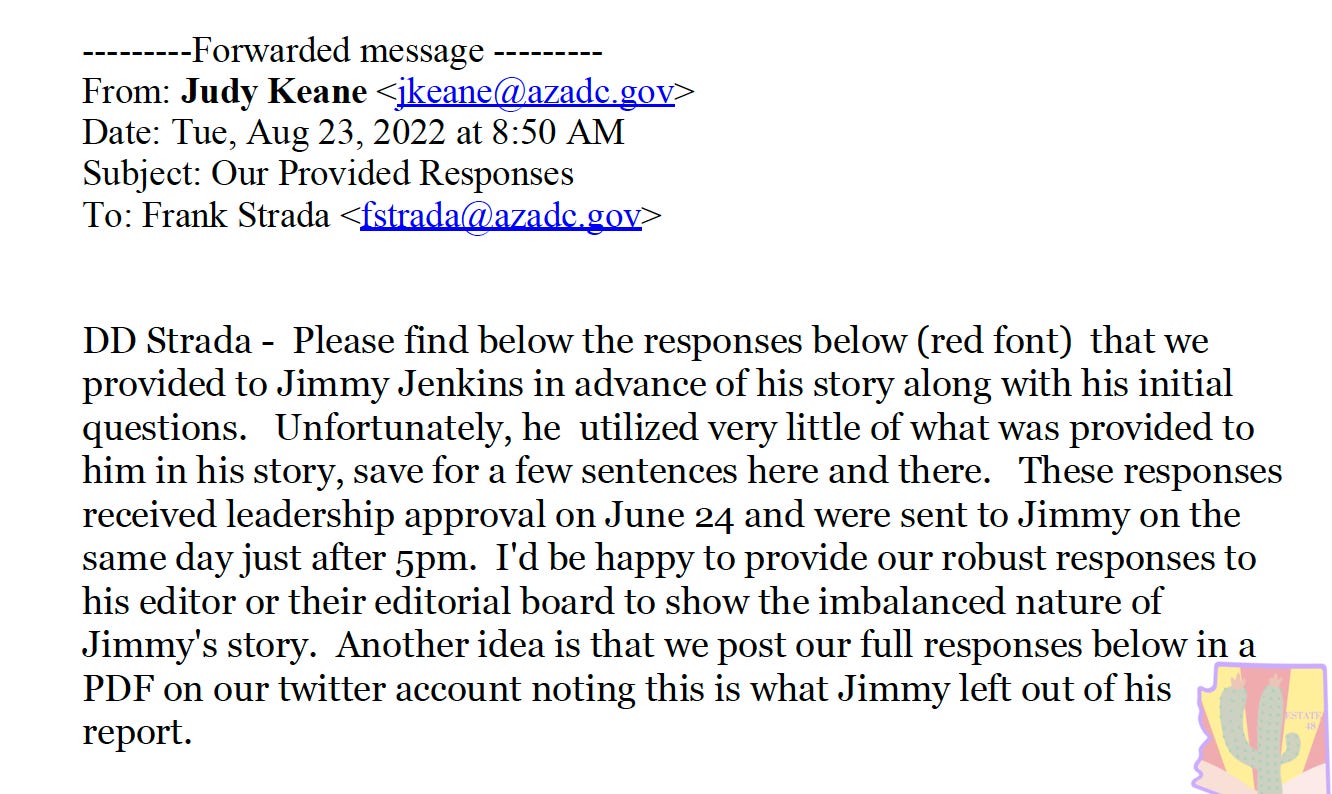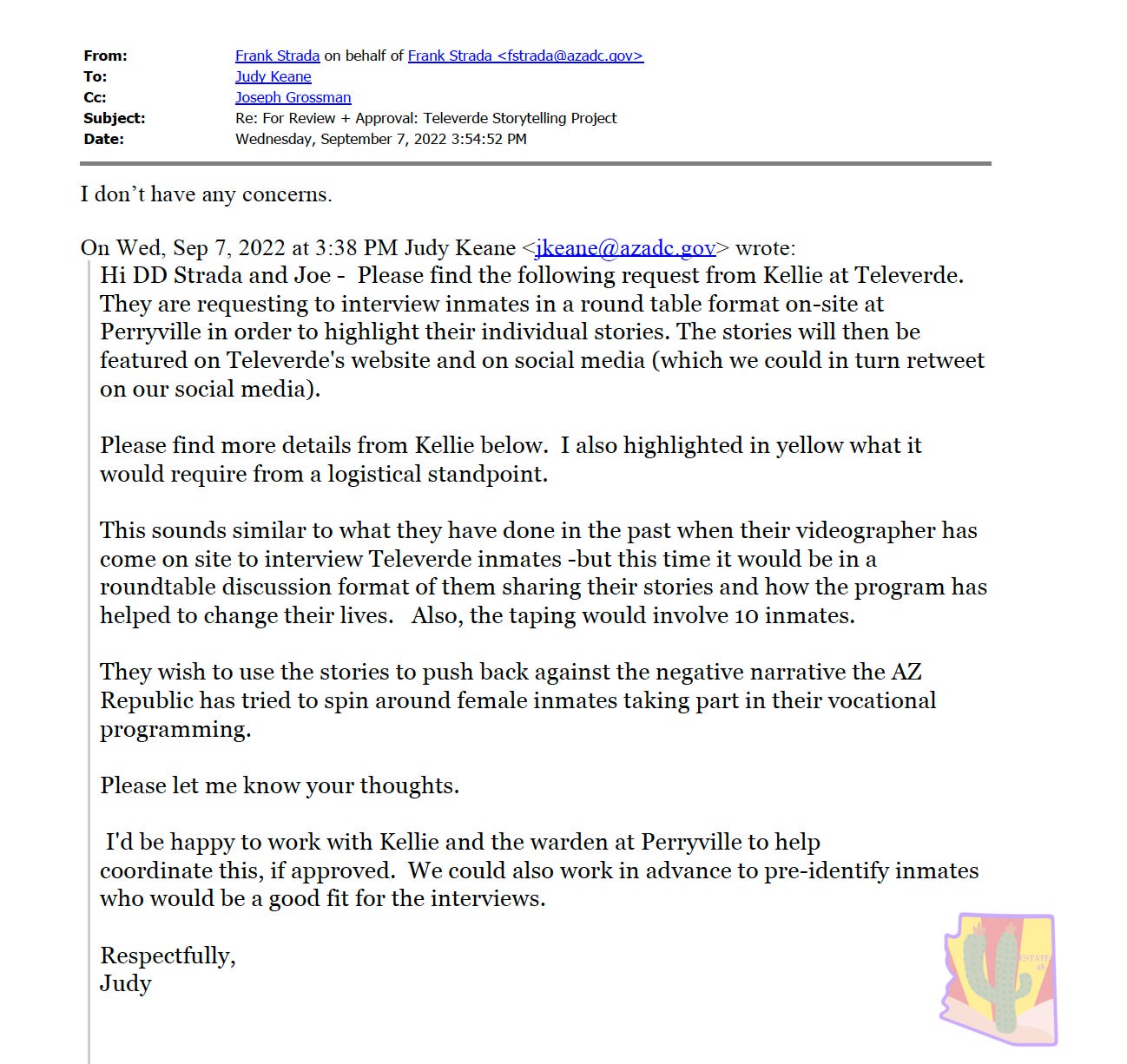For nearly three years, the Arizona Department of Corrections, Rehabilitation and Reentry (ADCRR) withheld records related to communication about journalist Jimmy Jenkins and coverage by The Arizona Republic. When the documents were finally released — 990 days after my public records request — they revealed a troubling portrait of a public agency more concerned with controlling narratives than embracing transparency.
In 2022, Jenkins requested a tour of the Lewis prison complex in Buckeye, Arizona, following years of investigative reporting on conditions inside Arizona prisons. Just days after publishing an August 22 story citing correctional officers who warned of collapsing security and severe staffing shortages, Jenkins was denied access.
The newly released records confirm that ADCRR leadership, including then-Director David Shinn, blacklisted Jenkins following the article's publication. Internal emails show agency officials discussing the "imbalanced nature" of Jenkins' reporting, accusing him of omitting key responses, and contemplating a rebuttal op-ed — which was written but never published by the Republic.
In one message, Communications Director Judy Keane suggested posting the department's full replies on Twitter, lamenting, "this is what Jimmy left out of his report."
While criticizing Jenkins for using unnamed sources, internal discussions also acknowledged the Department had not completed a study to back up their public claims about recidivism. One senior official questioned why their own website listed a 40% recidivism rate and suggested revisiting the numbers.
The records also show that lawmakers, including then-Rep. Kelli Butler, urged ADCRR to reconsider and allow Jenkins to attend a tour with legislators. Her email emphasized that Jenkins could document what they were not allowed to photograph themselves. ADCRR refused.
Other reporters faced similar resistance. Journalist Joseph Darius Jafaari, now with LOOKOUT, also requested interviews from the department that went unfulfilled, and now-former Republic data reporter Justin Price inquired about Correctional Industries. Even after noting he'd been in touch with communications, internal staff still debated whether to allow ACI leadership to speak directly.
The documents reveal that ADCRR and its private partner Televerde, which employs incarcerated women at Perryville, coordinated PR strategy to counter Jenkins' coverage. A September 7 email said Televerde wanted to use stories to "push back against the negative narrative the AZ Republic has tried to spin."
The project would feature voluntary, first-person video narratives from incarcerated women in Arizona and Indiana who work for the company, emphasizing themes of redemption, personal growth, and second chances. A Televerde executive would oversee each filming, with participants prepped by the company’s communications team. The videos would be published on Televerde’s website, rotated regularly, and promoted via press releases and social media — all as part of a broader strategy to counter what the company called the Republic’s “biased” reporting.
This outreach underscores a coordinated effort between ADCRR and private contractors to shape public perception — rather than address the systemic issues raised by journalists.
These revelations echo broader national concerns. During the first Trump administration, journalists were labeled "the enemy of the people,” which only escalated from there. Press briefings were slashed1, and access to public institutions became a battlefield. During his second term already, reporters like CNN’s Jim Acosta were banned from the White House. The House just narrowly passed H.R. 4 which would cut funding for NPR and PBS. Press access was revoked for asking tough questions. And now, in Arizona, internal records from ADCRR show public servants treating fair reporting as an attack — labeling stories “biased,” blacklisting reporters, and coordinating with private partners to reshape the narrative rather than respond with transparency.
When public officials see scrutiny as sabotage, democracy suffers. And we’re seeing that happen in real time. The internal emails from ADCRR show that the same distrust of the press has seeped into state government.
In April, I watched legendary journalists Jorge Ramos and Marty Baron speak at ASU about the fragility of democracy and the press’s role in protecting it.
Ramos was a longtime Univision anchor, known for his fearless interviews and unwavering commitment to immigrant communities. Trump threw him out of a press conference over his questions about immigration.
Baron was the former editor of The Washington Post and The Boston Globe. He led groundbreaking investigations into the Catholic Church abuse scandal (immotalized in the Best Picture-winning film Spotlight), and held the Trump administration accountable with precision and restraint.
Ramos recalled fleeing Mexico after being censored for questioning power — and arriving in the U.S. stunned that people could openly criticize their president without fear. Baron, too, emphasized that “we must examine public characters and measures. That’s our duty.” Their message was clear: dissent is not disloyalty.
“If you're neutral when it comes to an injustice, then there's a problem with neutrality, Ramos said quoting a conversation he had with Desmond Tutu. “If an elephant puts his leg on the tail of a mouse, the mouse is not going to appreciate your neutrality.”
Trump, his administration, and his most fervent supporters are trying to silence the voices of anybody that disagrees with or criticizes him.
The Arizona Department of Corrections blacklisted a reporter because of “negative” stories about how they have handled prisons in the state.
I’ve had lawmakers threaten to have me investigated over my reporting or complain to editors (or me) about me making them look bad. My response to that has remained the same for years. “I’m not making you look bad — I’m simply reporting your words and actions as they are.”
Transparency is not a courtesy. It is a taxpayer right. These emails — buried for nearly 1,000 days — shouldn't just spark outrage. They should serve as a call to defend the role of journalists in holding public institutions accountable. Democracy doesn’t die when journalists are silenced — it dies when the public stops paying attention.
”Freedom of the Press, if it means anything at all, means the freedom to criticize and oppose.” - George Orwell
Arizona’s Stephanie Grisham didn’t even hold a single press conference during her time as press secretary. She later defended that decision at the DNC to support Kamala Harris over her former boss. "It's because, unlike my boss, I never wanted to stand at that podium and lie," she said. "Now here I am behind a podium advocating for a Democrat, and that's because I love my country more than my party. Kamala Harris tells the truth. She respects the American people, and she has my vote."








